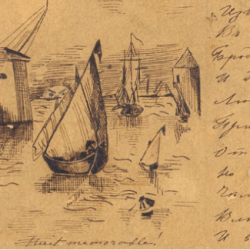Mister Potato Head owns a place in the pantheon of great toys. But it used to be better. The plastic head with pre-drilled holes used to be Styrofoam. You could put the eyes or nose wherever you wanted, making a real Picasso. The head eventually would crumble into pieces, and watching Mr. Potato Head's head disintegrate probably put a couple of kids into therapy. It was still a great toy. But what makes for a great toy can make for bad, even dangerous, spirituality. Many of the voices revisioning Jesus today simply are playing Mr. Potato Head. We make Him over in the image of our politics, pet beliefs, and addictions to comfort and convenience. We launch a new quest for the "historical Jesus." In short, we make Him over to look like us as much as we can.
Greg Carey, in Sinners: Jesus and His Earliest Followers, says this goes all the way back to Jesus in the first century, to those either threatened by or drawn to Him. Using Carey's term, Jesus displayed behaviors the religious mainstream regarded as "deviant." His inner circle was a mongrel bunch of fishermen, corrupt tax collectors, terrorist zealots, and nobodies. He broke with almost all their religious traditions without breaking the Law of Moses. If there was real sin, point it out! (See Jn. 8:46.) They couldn't. They wanted a Jesus who would applaud them and a Jesus that they could control. When they couldn't fit Him into their mold, they lashed Him with their worst names—"sinner" (Jn. 9:24) and "demonized" (Jn. 7:52). And He spent a lot of time with others that they pictured the same way. He not only paid attention to corrupt tax collectors, the demonized, the scarred by disease, and women of scarlet reputation but He enjoyed Himself at their weddings and feasts.
We describe these people as the "marginalized"—such a sterile word to describe the brutal thrusting of people in God's image to the outer limits of human discourse and decent treatment and then padlocking them there. For some of these, their sin was quite real and public. For others, life and the sin of others had made their souls ugly. And people who believed in an inerrant Bible (O.T. only), tithed not only their money but even their spices, prayed long beautiful prayers, and never would miss a Sabbath service found Jesus and His whole revolting enterprise blasphemously repulsive beyond words.
Carey's high water mark is chapter six, entitled "The Scandals of the Cross." Never was Jesus more despised, more "deviant" than when, and in the way in which, He died. As I write, it's one week until Easter. Christians will run around frantically pulling together dyed eggs, marshmallow peeps, ham and side dishes and little outfits to be displayed and photographed on Sunday. As they dash breathless into Easter morning service, some will think, "Oh, yeah, Good Friday was two days ago." Thousands will not remember at all.
I remember walking through a display of photos of black lynchings. I walked slowly and made myself stare. Greg Carey makes us walk slowly and stare hard at this death that nauseated the "atrocity in the coliseum" loving Romans and made the Jews think that anyone crucified was truly and literally damned to hell. The end was not just to kill but to do it in the most humiliating, drawn out way possible. Those who watched would learn. As He "was wounded for our transgressions . . ." (Is. 53), this chapter makes a good strong teaspoon of Good Friday as an antidote for our "Mr. Potato Head" moments.
Greg's use of the word "deviant" may throw the reader a communication curve. I know how he uses it; that is, that "deviant" defines a departure from a commonly accepted norm. Sociologists and statisticians use it this way. But, in our culture, deviance can range from someone who puts ketchup on a donut to someone who does despicable things to small living things up through human beings with no remorse. Don't get tangled up or derailed by this. What if the commonly accepted norm marks a gross deterioration from God's purposes and standards? Then those running hard to know and serve God may appear to be the "deviant" ones; they may also be the healthiest. The mother of William Wilberforce was asked about her son's descent into the "madness" of converting to Christianity. "If this is madness," she replied, "I hope he bites us all." A good praying grandmother or a faithful children's Sunday School teacher can show us the same thing.
A word of warning here. Greg Carey doesn't let us look through first century eyes as in a PBS Special and sit back saying contentedly, "My, wasn't that fascinating?" He raises the nasty point that the respectability that distanced itself from Jesus and His followers can and does seep into the lives of His "deviant" followers until they become the new respectability police with "God" in their box. William Booth, founder of the Salvation Army, brought some of the street denizens of the London slums to his church. The elders pulled him aside later chastising him for bringing people like these into the church. With contempt dripping from his tongue, Booth reminisced, "The church born in a firestorm under Wesley had become respectable." He cites many great, but not comfortable, examples of people getting their redemption dirty and dented, especially from the book God's Long Summer by Charles Marsh.




